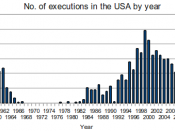Tina Sala
AP Lang
Against the Death Penalty
The death penalty has afflicted the world we live in for ages, dating back several centuries as well as altering the way we handle crimes. In the 18th Century BC, the Code of King Hammurabi of Babylon codified the death penalty for twenty five different crimes, promoting the idea of "an eye for an eye and tooth for a tooth." Britain has influenced the colonies more than any other country and has a long history of punishment by death. While the death penalty has continued to spark controversy around the globe and inspire political as well as moral questions, there is one considerable issue that has remained prevalent-the actual effects it has on present-day murder rates.
Capital punishment within the United States has become more of an inhumane practice and should not be considered an available punishment. Instead of serving as deterrence for potential crimes, the death penalty inhibits the intolerance for murder of any kind.
If it is against the law to take an individual's life, why should it be legal to strip a criminal of their humanity? It is erroneous of us to believe that a murderer's life is any less sacred than a victim's is. Even so, the National Research Council has concluded that studies claiming that the death penalty affects murder rates are "fundamentally flawed" because they do not consider the effects of noncapital punishments and use "incomplete or implausible models" (AmnestyUSA, 2009). In fact, the murder rate in states with the death penalty has remained consistently higher than the rate in non-death penalty states. The threat of future execution is unlikely to enter the minds of those acting under the influence of drugs and/or alcohol, those who are panicking while committing another crime (such as a robbery),


